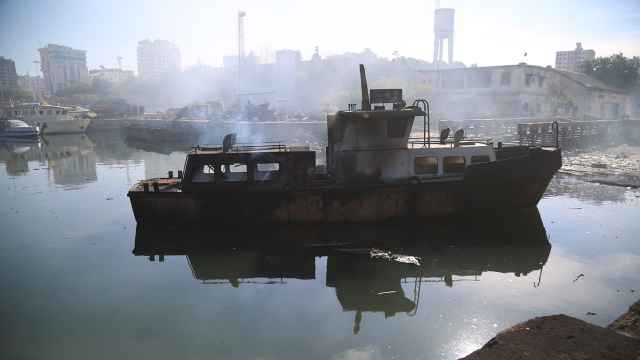VIENNA — The two consortiums competing to pipe Azerbaijan's Caspian Sea gas into western European markets still have an equal chance of success, Shah Deniz gas field operator BP said Thursday.
The Shah Deniz consortium is expected to choose by midyear whether to pipe gas from the Shah Deniz development into Austria through the proposed Nabucco West pipeline or into Italy through the rival Trans-Adriatic Pipeline.
"I genuinely believe both pipelines at the moment have an equal chance," said Al Cook, who is in charge of BP's Azeri operations. "There's certainly no clear-cut answer at the moment," he told reporters at a conference in Vienna.
BP is aiming for the first gas from Shah Deniz II to be delivered to existing customer Turkey in 2018, with early 2019 set for the first Azeri gas to reach western Europe, a major development that will reduce European dependence on Russia for its energy supplies.
The selected pipeline will bring billions of dollars in investments for the countries through which it travels: Bulgaria, Romania, Hungary and Austria in the case of Nabucco and Greece, Albania and Italy if TAP wins the contest.
The trans-Anatolian gas pipeline will bring the Azeri gas through Turkey to the edge of Europe to connect either with Nabucco West or TAP.
Shah Deniz, Azerbaijan's biggest gas field, is being developed by consortium partners BP, Statoil, Azeri state energy firm SOCAR, Total and others and is estimated to contain 1.2 trillion cubic metres of gas.
Shah Deniz I has been pumping gas since 2006.
After a deal signed earlier this month, the Shah Deniz consortium owns equity options in both pipeline projects.
Cook said BP had sent out questionnaires Wednesday to Nabucco and TAP asking them identical questions about their respective projects, and it expects answers soon so that it can make a decision by the end of June.
The criteria include profitability, engineering quality, safety and environmental provisions, the political commitment of the governments involved, quality of personnel and potential for future expansion, Cook said.
"Fundamental amongst them is obviously the commerciality," he said, adding that the customer supply contracts that each of the rivals could achieve would be a major factor.
Related articles:
A Message from The Moscow Times:
Dear readers,
We are facing unprecedented challenges. Russia's Prosecutor General's Office has designated The Moscow Times as an "undesirable" organization, criminalizing our work and putting our staff at risk of prosecution. This follows our earlier unjust labeling as a "foreign agent."
These actions are direct attempts to silence independent journalism in Russia. The authorities claim our work "discredits the decisions of the Russian leadership." We see things differently: we strive to provide accurate, unbiased reporting on Russia.
We, the journalists of The Moscow Times, refuse to be silenced. But to continue our work, we need your help.
Your support, no matter how small, makes a world of difference. If you can, please support us monthly starting from just $2. It's quick to set up, and every contribution makes a significant impact.
By supporting The Moscow Times, you're defending open, independent journalism in the face of repression. Thank you for standing with us.
Remind me later.





